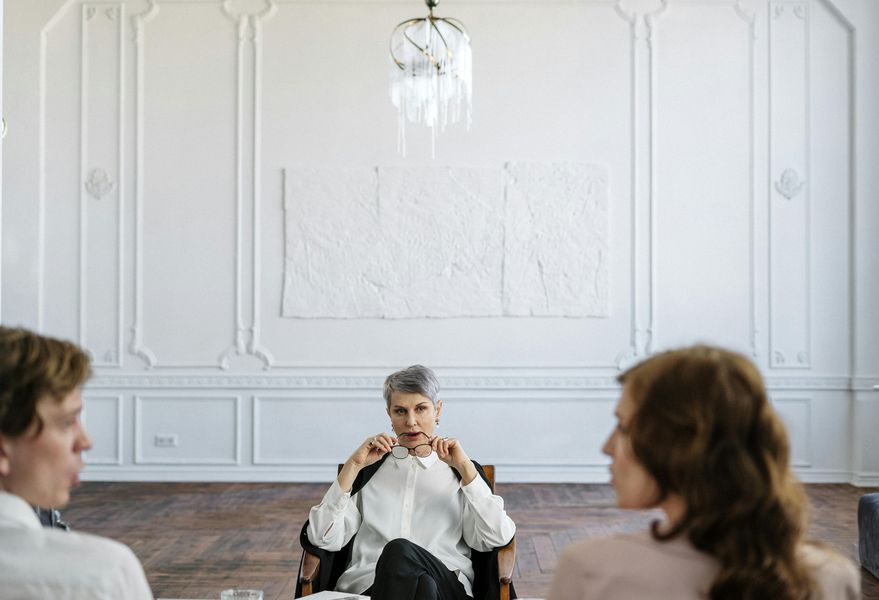Couples Therapy: The Truth About Its Efficacy and How to Make It Work
Are you and your partner experiencing difficulties in your relationship? Maybe you’ve been arguing more than usual, or perhaps you’ve grown apart emotionally.
Whatever the reason, the fact remains that you and your partner are not as happy as you once were. If this describes your situation, you might be considering couples therapy.
Maybe you have concerns about whether or not couples therapy actually works. Maybe you’re worried that you or your partner won’t be willing to participate fully.
Or maybe you simply don’t know what to expect from couples therapy. In this article, we’ll explore the effectiveness of couples therapy, what factors impact its success, and why willingness to participate is crucial.
By the end, you will have a clearer understanding of couples therapy and how to make it work for you and your partner. Does Couples Therapy Work?
Many people wonder if couples therapy is effective. The question is understandable given the investment of time, energy, and money the process demands.
The truth is that couples therapy can be a powerful tool for improving your relationship. Research shows that most couples who participate in therapy experience significant improvements in their marriage satisfaction.
Emotionally Focused Couples Therapy, in particular, has been found to be highly effective, with more than 70% of couples experiencing improvement. However, it’s important to remember that couples therapy isn’t a one-size-fits-all solution.
There are many factors that impact how successful couples therapy will be for you and your partner.
Factors That Affect Couples Therapy Success
1. Participation
The first factor that affects the success of couples therapy is participation. Both partners must be willing to participate fully and consistently.
If either partner is not on board, the therapy will not be as effective.
2. Quality Counselor
The second factor is the quality of the counselor.
Look for someone with training and experience in couples therapy. Read reviews and ask for recommendations from people you trust.
3. Open and Honest Communication
The third factor is open and honest communication. Couples who are willing to be vulnerable and honest with each other during therapy are more likely to see successful outcomes.
Be prepared to share your thoughts, feelings, and needs openly and honestly.
4. Conflict Resolution
The fourth factor is the ability to resolve conflicts effectively.
Couples who are skilled in conflict resolution are more likely to see improvements in their relationship over time. Be prepared to learn new skills and strategies for resolving conflicts.
5. Improving Communication
The fifth factor is improving communication. Therapy can help couples learn to communicate more clearly and effectively with each other.
Through therapy, you will learn how to listen actively, express yourself clearly, and respond constructively.
6. Building Trust and Rebuilding
The sixth factor is building trust and rebuilding.
Trust may have been damaged in your relationship, but therapy can help you and your partner rebuild it. Be patient, and be willing to put in the work required to rebuild trust over time.
7. Patience and Honesty
The final factor is patience and honesty. Couples therapy is a process that takes time and effort.
Be willing to commit yourself to the process, and be honest with yourself, your partner, and your counselor about your progress and challenges.
The Importance of Willingness to Participate
Now that we’ve covered the factors that impact the success of couples therapy, let’s talk more about the importance of willingness to participate. Couples therapy can be uncomfortable and challenging.
You and your partner will be asked to confront difficult issues and work through challenging emotions. It’s crucial that both partners are willing to participate fully and work through these challenges together.
There may be times when you or your partner feel frustrated, angry, or overwhelmed. But if both of you remain committed to the process, you can emerge from couples therapy with a stronger, healthier, and more fulfilling relationship.
Tasks and Assignments May Be Uncomfortable
During couples therapy, you and your partner will likely be given tasks and assignments to complete outside of the sessions. These tasks and assignments are designed to help you and your partner work through your issues and build new, healthier habits.
It’s important that you approach these tasks and assignments with honesty, openness, and a willingness to learn. At times, these tasks and assignments may feel uncomfortable or even challenging.
But remember that they are designed to help you and your partner grow and improve your relationship. Be willing to embrace discomfort and try new things in order to make progress.
Conclusion
Couples therapy can be a powerful tool for improving your relationship. The research shows that most couples who participate in therapy experience significant improvements in their marriage satisfaction.
However, the effectiveness of couples therapy depends on several factors, including participation, quality of the counselor, open and honest communication, conflict resolution, improving communication, building trust and rebuilding, and patience and honesty. It’s crucial that both partners are willing to participate fully and work through the challenges that arise during therapy.
Tasks and assignments may be uncomfortable, but they are designed to help you and your partner build a stronger, healthier relationship. If you and your partner remain committed to the process of couples therapy, you can emerge with an even stronger bond and a happier, more fulfilling relationship.
Choosing a Quality Counselor: Ensuring Compatibility and Avoiding Potential Failure
Couples therapy can be a powerful tool for improving your relationship, but choosing a qualified and compatible therapist can make all the difference. Majority of couples who participate in therapy experience significant improvements in their marriage satisfaction but some may not see the results they want, even after several sessions.
If you are not seeing improvement in your relationship, it may be time to consider changing therapists.
The Importance of Therapist Compatibility
One of the most important factors to consider when choosing a couples therapist is compatibility. Finding a therapist who is a good fit for both you and your partner is key to a successful therapy experience.
Compatibility involves not only professional qualifications but also personal style and approach to therapy. Look for a therapist who specializes in couples therapy, and who has the necessary credentials and experience.
Research the therapist’s background and read reviews to ensure that they are well-regarded in the profession.
In addition to professional qualifications, it is important that you and your partner feel comfortable working with the therapist.
During your initial consultation, take note of how you feel during the session. Does the therapist put you at ease?
Are they easy to talk to? Do you feel like they are listening to you and your partner?
If you do not feel comfortable with the therapist, it may be worth considering another therapist who is a better fit.
Potential Failure if Not the Right Therapist
Failure to find the right therapist for your needs may lead to worsening of your relationship. Couples therapy can bring up deep-seated issues that you and your partner may not be prepared to work through.
If you and your partner start couples therapy with a therapist who is not a good fit, it may exacerbate existing problems, create new ones, and lead to further deterioration in your relationship. If you find that you are not seeing the results you want with your therapist, do not be afraid to change therapists.
Changing to a different therapist offers a fresh perspective and can help you and your partner get back on track. It may take time to find the right therapist for you, but it is worth the effort.
Importance of Open and Honest Communication: Talking Constructively Without Negative Feelings
Effective communication is key to a fulfilling relationship. Couples who are able to express themselves honestly and respectfully tend to have healthier, more satisfying relationships.
However, it can be difficult to address grievances constructively without becoming defensive or making your partner feel attacked.
Importance of Handling Problems Constructively
Even the happiest couples face problems and conflicts. Learning how to handle these issues constructively is key to a successful relationship.
When addressing grievances, it is important to avoid becoming overly defensive or making accusations toward your partner. Instead, focus on your own feelings and how you can work together with your partner to improve the situation.
Remember that it is important to address both big and small subjects. Discussing only the small subjects may lead to bigger issues of resentment and frustration later on.
Importance of Learning to Talk Honestly and Respectfully
Learning to talk honestly and respectfully is key to constructive communication in any relationship. When discussing negative feelings, it is important to use “I” statements to avoid putting your partner on the defensive.
For example, saying “I feel upset when you criticize me in front of others” rather than “You always make me feel bad when you criticize me”. Using “I” statements is a positive and healthier way to communicate as it does not put the blame on the other person.
Another important part of constructive communication is listening. Listening to your partner and asking for clarification can prevent miscommunication and avoid misunderstandings.
When addressing problems, it is important to work together to find a solution that works for both parties. Couples who are able to work through problems constructively and find common ground are more likely to have happy, fulfilling relationships.
Conclusion
Choosing a quality couples therapist and learning to communicate constructively are key to developing a healthy and fulfilling relationship. Compatibility with your therapist and the importance of constructive communication are both vital in helping you and your partner achieve success in couples therapy.
Remember that finding the right therapist may take time, but the results can be worth the effort. Finally, effective communication is as much about listening as it is about speaking.
It is only through open and honest communication that you and your partner can successfully resolve conflicts and deepen your relationship. Embracing Conflict Resolution: Using It as a Teaching Tool
One common misconception about couples therapy is that it is only useful for addressing problems or conflicts that already exist within a relationship.
However, couples therapy can also be a powerful teaching tool for healthy communication, including conflict resolution.
Conflict Resolution as a Teaching Tool
Conflicts are an inevitable part of any relationship. In couples therapy, conflicts can be used as a teaching tool to help couples learn how to communicate more effectively.
Couples who are able to communicate well—by talking, listening, agreeing, disagreeing, and attacking the problem, not each other—are more likely to have successful, fulfilling relationships. In therapy sessions, couples may be asked to practice conflict resolution skills by addressing specific conflicts that exist in their relationship.
These exercises can be uncomfortable or even painful, but they are designed to help couples learn how to communicate in a healthy, productive way. The goal is not to win an argument, but rather to learn how to communicate more effectively, understand each other’s perspectives, and find common ground.
Avoidance of Using Therapy as an Arena for Arguing
Couples therapy should not be used as an arena for arguing or attacking each other. Rather, it should be viewed as a teaching tool for communication and conflict resolution.
It is important for couples to understand that therapy is a safe space where they can learn and grow together. By adopting this mindset, couples can approach therapy in a positive, constructive way.
Strengthening the Relationship: Focusing on Bonding and Appreciation Building
Couples therapy is not just about addressing problems or conflicts that exist in a relationship. It is also about strengthening the bond between partners and building appreciation for each other.
In fact, focusing on bonding and appreciation building is crucial to developing a healthy, fulfilling relationship.
Focus on Bonding and Appreciation Building
Bonding activities can help couples deepen their connection and trust in each other. Simple activities such as cooking together, taking a walk, or doing a puzzle can help you feel more connected to your partner and create a shared bond.
These activities can be enjoyable and fun, and can be incorporated into your daily life. Appreciation building is another key component of strengthening a relationship.
It is important to remember the reasons why the partnership works and the things you appreciate about your partner. During couples therapy, couples are given time and space to reflect on their relationship and express gratitude for each other in small, everyday moments.
This helps to build a strong foundation based on trust, respect, and appreciation.
Importance of Remembering Why the Partnership Works
When you are facing problems within your relationship, it can be easy to lose sight of the reasons why you and your partner came together in the first place. In therapy, it is important to take time to remember why you love and appreciate your partner.
This helps to keep your relationship in perspective and strengthens the bond between you. In conclusion, while conflict resolution is a key component of couples therapy, it is important to remember that therapy can also be a teaching tool for healthy communication and appreciation building.
Couples who approach therapy with a positive, constructive mindset can develop a deep, trusting bond that lasts a lifetime. Focus on bonding and appreciation building, and remember why the partnership works.
Through couples therapy, you and your partner can work together to build a strong foundation based on love, trust, and mutual respect.
The Importance of Patience and Honesty in Couples Therapy
When a relationship is struggling, it can be tempting to look for quick fixes and immediate results. However, the truth is that couples therapy takes time and effort to be successful.
Understanding and practicing patience and honesty is critical to the success of couples therapy.
Importance of Sincerity in Wanting to Save the Relationship
When a couple decides to pursue therapy, it is important that both partners are sincere in their desire to save the relationship. Couples who are not fully committed to the process may not see the results they want.
In order to be successful in couples therapy, both partners need to be determined to work on the relationship. It is not enough to simply attend therapy sessions.
Couples must also be willing to practice the exercises and strategies they learn during therapy between sessions, and to communicate openly and honestly with each other.
Acknowledge That Success Takes Time
Even with a sincere and determined commitment to couples therapy, it is important to acknowledge that success takes time. Patience is a key component of the process.
It is important to recognize that change does not happen overnight. Couples therapy is not a magic solution to relationship problems, and it requires time and work.
Success can only be achieved through a combination of time, effort, and determination. It is important to remember that positive results can take weeks or even months to materialize.
It is also important to acknowledge that progress is not always linear. There may be setbacks or challenges along the way.
During these moments, remember that success takes time, and that the journey is not always smooth.
Importance of Honesty
Honesty is the foundation of any healthy relationship, and it is critical to the success of couples therapy. It is important to be honest with both yourself and your partner.
This means acknowledging your own faults and weaknesses, and taking responsibility for your own actions. When discussing problems or conflicts with your partner, it is important to address the issue directly and honestly.
This does not mean attacking your partner or placing blame. Rather, it means communicating your feelings in a respectful and constructive way.
Practicing Honesty Through Active Listening
Active listening is a key component of honest communication. It involves giving your partner your undivided attention and truly hearing what they have to say.
Active listening means asking for clarification and showing empathy for your partner’s feelings. During couples therapy, practicing active listening can help to build honest communication and deepen the connection between partners.
It is a powerful tool that can help to bridge the gap between partners and lead to a deeper understanding of each other’s perspectives.
Conclusion
Couples therapy can help to improve the communication and connection between partners, but it takes time, patience, and honesty. Both partners must be sincere and determined in their commitment to the process, and must be willing to work diligently to achieve success.
Honesty is critical to the success of couples therapy, and involves being honest with yourself and your partner, communicating constructively and respectfully, and practicing active listening. By embracing these qualities, couples can work together to build a stronger, healthier, and more fulfilling relationship.
In conclusion, couples therapy is a powerful tool for improving relationships, but its success depends on several important factors. Finding a quality counselor who is a good fit for both partners is crucial.
Open and honest communication is key to addressing conflicts constructively and building a strong foundation of trust and appreciation. Embracing conflict resolution as a teaching tool helps couples learn how to communicate more effectively, and focusing on bonding and appreciation building strengthens the connection between partners.
Patience and honesty are critical to the success of couples therapy, as time, work, and determination are necessary to achieve positive results. By embracing these factors, couples can work together to build a healthier, more fulfilling relationship.



